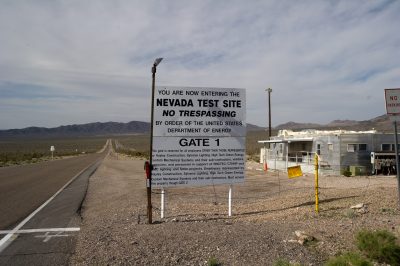Is America Preparing for Nuclear War? Explosion at Nevada Nuclear Test Site
The National Nuclear Security Administration team conducted a "subsurface chemical explosion"

All Global Research articles can be read in 51 languages by activating the Translate Website button below the author’s name.
To receive Global Research’s Daily Newsletter (selected articles), click here.
Click the share button above to email/forward this article to your friends and colleagues. Follow us on Instagram and Twitter and subscribe to our Telegram Channel. Feel free to repost and share widely Global Research articles.
***
Federal officials this week tested an explosion at the Nevada National Security Site that was led by the National Nuclear Security Administration, according to a statement.
on Wednesday, said the Department of Energy in a press release. It said that the reason for the test was to improve how military officials can detect low-yield nuclear blasts.
“These experiments advance our efforts to develop new technology in support of U.S. nuclear nonproliferation goals,” Corey Hinderstein, an agency deputy administrator, said in the release. “They will help reduce global nuclear threats by improving the detection of underground nuclear explosive tests.”
Wednesday’s “experiment” was carried out in the “P tunnel in Area 12” of the test site and used “chemical high-explosives and radiotracers,” the Department of Energy said. It did not elaborate.
“The experiment will help validate new predictive explosion models and detection algorithms,” the release said. “Measurements were collected using accelerometers, seismometers, infrasound sensors, electromagnetic sensors, chemical and radiotracer samplers, and meteorological sensors.”
Nuclear Blasts
The Nevada National Security Site, which is known as the Nevada Test Site, is a location in remote Rye County that was used since the 1950s to test nuclear weapons. More than 1,000 nuclear blasts have been tested at the site over the years, according to research. Since 1992, more than 27 subcritical tests have been carried out.
The Comprehensive Nuclear Test Ban Treaty was adopted by the United Nations General Assembly in 1996. It bans nuclear explosions anywhere in the world, but it has not been ratified by the United States, North Korea, Israel, Egypt, India, China, Pakistan, and Iran, although Russia has ratified it.
There have been concerns that Moscow could again restart nuclear testing in a bid to prevent the West from supporting Ukraine’s military.
Earlier this month, Russian President Vladimir Putin said that his country might abandon the test ban treaty. Russian lawmakers also recently announced a move to revoke the ratification of the Comprehensive Nuclear Test Ban Treaty, according to reports.
Moratorium on Russian Nuclear Tests?
The speaker of the Duma, or Russia’s parliament, said via his Telegram channel that Moscow would withdraw from the agreement and blamed the United States.
“In the interests of ensuring the security of our country, we are withdrawing the ratification of the Comprehensive Nuclear Test Ban Treaty,” said Speaker Vyacheslav Volodin, adding that Washington has failed to ratify the treaty owing to what he called an “irresponsible attitude to global security issues,” according to a translation.
Mikhail Kovalchuk, a top Russian scientist, said in September that Moscow could test its future nuclear weapons at a test site in Novaya Zemlya, an archipelago in northern Russia, in a bid to scare the West and the United States.
“The situation is exactly the same now,” he said, referring to Cold War-era nuclear testing carried out by the Soviet Union and the United States. “It’s enough to carry out tests on Novaya Zemlya … at least once. And everything will fall into place,” he added.
But after the Nevada explosion this week, Mikhail Ulyanov, the Russian envoy to the United Nations, said that Russia would continue to maintain its moratorium on nuclear testing unless the Comprehensive Nuclear Test Ban Treaty is revoked by parliament.
“Never say never. Tests may resume under certain circumstances. I believe that such a development would be negative for the modern world, for maintaining stability,” he told Russian state media. “We have enough turbulence in international relations and wouldn’t want another powerful factor added.”
Israel–Hamas Conflict
The test explosion in Nevada also comes in the midst of heightened tensions over the Israel–Hamas conflict, where Hamas terrorists attacked multiple areas in Israel, killing hundreds of civilians. Israel has responded with an extensive bombing campaign targeting Gaza, leading to widespread condemnation and protests across the Middle East as U.S. officials have scrambled to prevent a broader war from erupting.
The United States also positioned several aircraft carrier groups closer to Israel since the conflict erupted earlier this month. On Wednesday, Pentagon officials said a U.S. Navy destroyer shot down missiles that were likely fired from Houthi militia groups in Yemen, although they said the U.S. assets were not the missiles’ intended targets and no injuries were reported.
Several U.S. bases were also targeted by drones in Iraq and Syria in recent days. A drone attack targeting a U.S. base in Syria resulted in “minor injuries,” said Pentagon spokesman Pat Ryder at a Wednesday news conference.
*
Note to readers: Please click the share button above. Follow us on Instagram and Twitter and subscribe to our Telegram Channel. Feel free to repost and share widely Global Research articles.
Jack Phillips is a senior reporter for The Epoch Times based in New York. He covers breaking news.
Featured image is from the Public Domain

